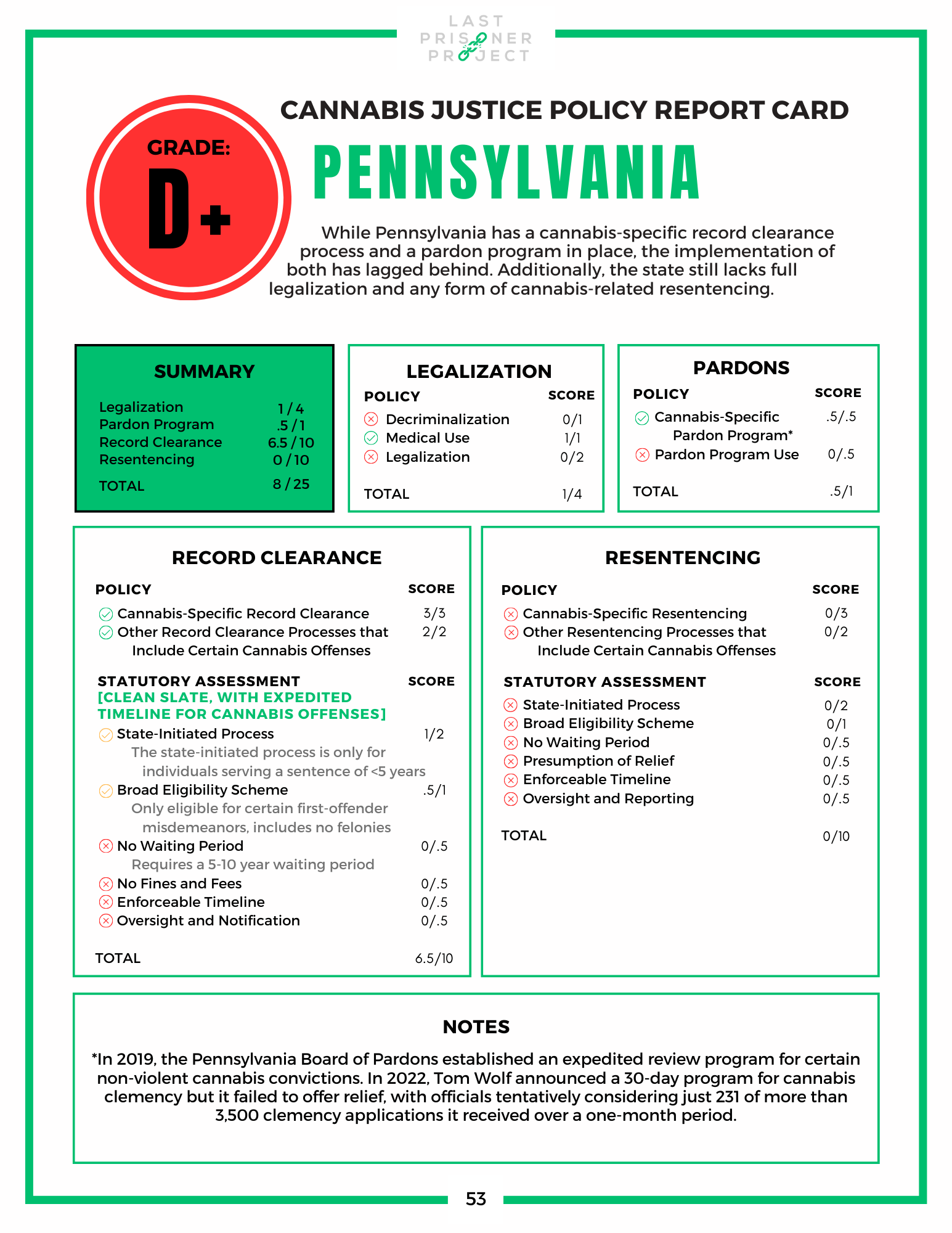Pennsylvania Must Prioritize Expungement and Resentencing in their Push to Legalize Cannabis
Governor Shapiro called on the Pennsylvania legislature to legalize adult-use cannabis in his annual budget address earlier this month. The governor noted that any legalization proposal must include expungement provisions for those criminalized during prohibition.
The inclusion of criminal justice reform policies has become the standard for states that have sought to legalize cannabis. Since 2018, 13 of the 14 states that have legalized cannabis have included record clearance policies, and since 2021, they have all been state-initiated, except for Ohio. While resentencing policies have been slower to take hold, they are also growing in importance and have been included in more than half of the legalization bills since 2020.
As the first state in the nation to develop and implement “Clean Slate” record clearance, Pennsylvania is uniquely positioned to implement these government-initiated retroactive relief processes successfully. Pennsylvania set up
Clean Slate in 2019 to help automate the record clearance process. Since its inception, Pennsylvania’s Clean Slate law
has sealed over 40 million records. Last year,
Pennsylvania expanded its Clean Slate process to include eligible felony records and shortened the waiting time for eligible misdemeanor records to be sealed.
Pennsylvania’s Clean Slate record clearance process is already inclusive of cannabis offenses. However, cannabis offenses adhere to the same eligibility criteria and limitations that govern the record clearance process for other criminal convictions. When a state decides to legalize adult-use cannabis, they are explicitly acknowledging that once-proscribed conduct is not inherently criminal. As such, cannabis records should be put through a separate state-initiated expungement process that does not include any barriers to relief (e.g., waiting periods) because the state has already conceded that the underlying offense should no longer be criminalized.
Last Prisoner Project (LPP) has been pleased to see that many of the legalization bills that have been introduced in Pennsylvania acknowledge that cannabis criminal records should be treated differently in light of legalization and include provisions that would allow for the expungement of cannabis records. However, there are improvements that could be made to these legalization bills to ensure record clearance relief for every individual who has a cannabis criminal record while simultaneously setting up a state-initiated resentencing process for those who are incarcerated or under supervision for a cannabis-related sentence.
LPP recommends that any adult-use cannabis legalization bill include the following record clearance provisions:
- Creation of an automated court-initiated expungement process for any nonviolent cannabis record;
- Allow expungement of cannabis cases by petition for all other records;
- Require the Pennsylvania State Police to identify and expunge charges in its database that are not expunged through the automated court-initiated process; and
- Waive all financial obligations connected to these expunged cases.
LPP recommends that the following resentencing provisions be included in any legalization bill:
- The release from incarceration for individuals with marijuana possession convictions;
- The creation of an automated court-initiated process to schedule sentence reviews for all individuals serving periods of incarceration or supervision for a marijuana-related conviction;
- Ensuring that fair sentence reviews are provided for eligible individuals and deliberated over with limited discretion from stakeholders other than the judge; and
- Ensuring that eligible individuals receive resentencing hearings and decisions in a timely manner.
Since the start of the year, LPP has spoken with legislators to provide guidance regarding how these retroactive relief measures can be effectively incorporated into any adult-use legalization bill. We hope that the Pennsylvania legislature will take our recommendations seriously to ensure that the state repairs the harms caused during the War on Drugs, which have been particularly felt in communities of color that have been systematically targeted throughout the history of cannabis prohibition.
Pennsylvania has a long way to go to achieve full cannabis justice. Our recent State of Cannabis Justice Report only gave Pennsylvania a grade of "D+" when it comes to their cannabis justice policies. But, LPP will continue to advocate in the state to push forward robust retroactive relief measures as the state considers legalization.







